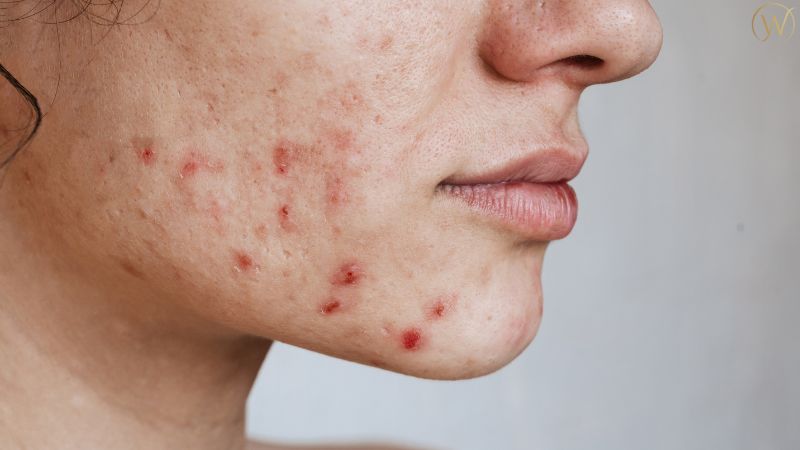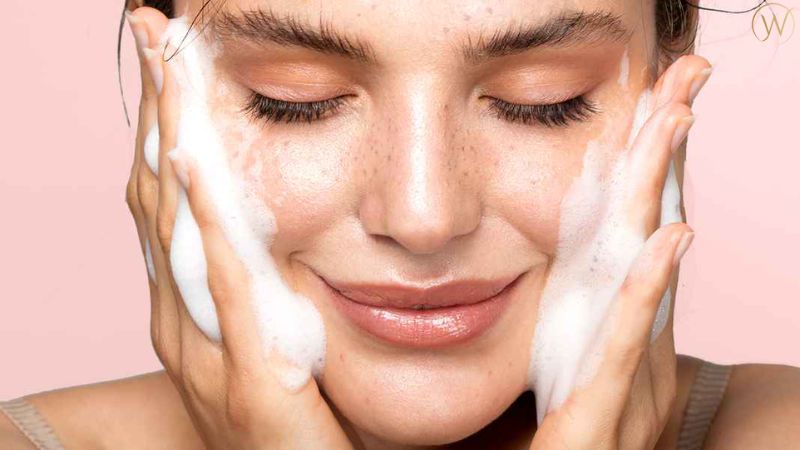Skin Care
Can I use face wash when I have acne?
How do pimples come about?
-
Hormonal changes during puberty
During puberty, hormonal changes in the body can cause the sebaceous glands to secrete too much oil, which can easily clog pores and cause acne. -
Unbalanced diet
Eating high-fat and high-sugar foods often will also stimulate excessive oil secretion, which will make acne grow more and more. -
Air Pollution and Dirt
Dust and pollutants in the air can clog pores, making the skin prone to inflammation and acne. -
Too much sunlight
Prolonged exposure to the sun makes sebum secretion more vigorous, which can lead to skin inflammation and acne breakouts. -
Stressful
When you are under too much emotional stress, your body will secrete cortisol, the "stress hormone", which further stimulates the sebaceous glands and causes acne to worsen. -
Side Effects of Certain Drugs
Things like corticosteroids or birth control pills may also give some people acne as a side effect.
Can I use face wash when I have acne? This is a problem for many people!
Acne is an annoying problem that almost everyone has experienced at one time or another, and it keeps us searching for an effective solution. Many people are hesitant to use cleansers when they have acne. In factProper Cleansing of the SkinThis is the first step in controlling and preventing acne. In this article, we'll show you the real answer!

Can I use face wash when I have acne?
For acne-prone skinCleansing your face daily with a cleanser is a very important step that should not be skipped.The cleanser effectively removes dirt and bacteria from the surface of the skin. Facial cleansers effectively remove dirt and bacteria from the skin's surface, helping to keep pores clear and reducing the risk of acne and pimples. In addition, some cleansers are moisturizing, replenishing the skin with moisture while cleansing. When the skin is sufficiently moisturized, the sebaceous glands will naturally produce less oil, thus reducing the risk of acne and pimples.Effective in preventing new acneThe
What should I keep in mind when choosing a cleanser for acne-prone skin?
If you have acne-prone skin, pay special attention to the following points when choosing a cleanser:
-
Choose products that contain effective anti-acne ingredients
Ingredients such as Salicylic Acid, Benzoyl Peroxide, Sulfur, or Glycolic Acid are known to deeply cleanse pores, fight bacteria, and help manage acne. -
Choose the type of product according to your skin type
Find out if you have oily, dry, combination or sensitive skin before choosing the right formula. For acne-prone skin, chooseA non-irritating, gentle cleanser that doesn't over-dry.The -
Avoid products with too much foam
A cleanser with too much lathering power may over-clean the skin, leading to dryness and even irritation, aggravating acne. -
Prioritize mild ingredients with natural extracts
Botanical extracts such as Aloe Vera, Chamomile, and Green Tea help to soothe skin and minimize irritation. -
Avoid products containing mineral oils
Mineral oils may cause clogged pores and further induce acne. -
Check product expiration dates and shelf life
Make sure the product is within the expiration date before use to avoid skin damage caused by expired products. -
New products are tested locally first
Test behind the ear or on the wrist before use to see if there is any allergic or irritating reaction and to avoid discomfort after full-face application.

Choosing the right cleanser is an important step to effectively maintain and control your acne condition. I hope the above content can help you answer"Can you use a cleanser for acne or not?"This is a common question.
Want to know more about the latestNutritional knowledge and skin care tips.Feel free to visit Dr. W's website and we will continue to share more useful information with you.
Extended Reading:
-
Top 10 Facial Cleansers for Oily Skin Recommended by Dermatologists
-
Can I use the cleanser every day? How many times a day should I wash my face?

